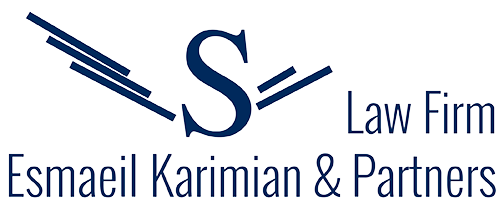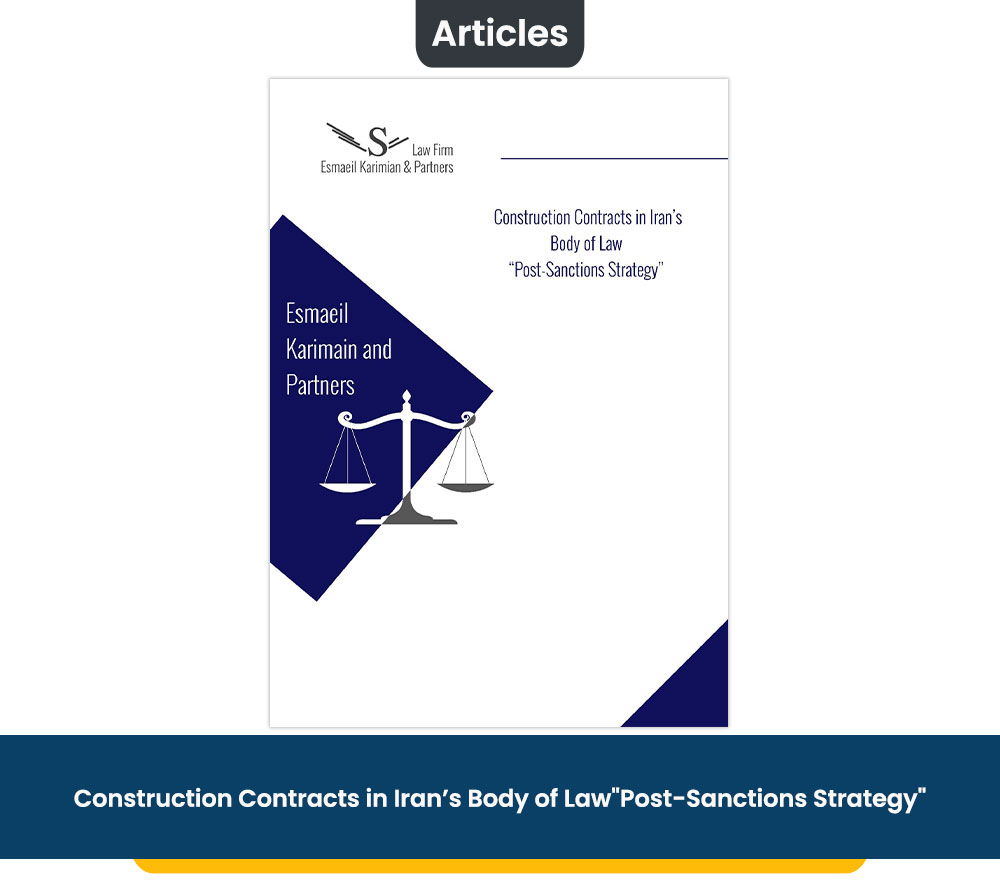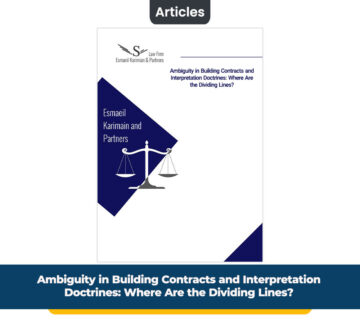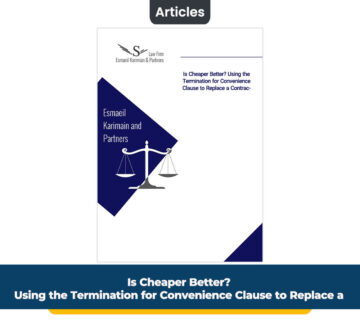In this article you will read:
Construction Contracts in Iran’s Body of Law
“Post-Sanctions Strategy”
Introduction
With property values exceeding those of similar-sized countries, Iran has seen a recent boom in the real estate market over 2016. Encouraged by the country’s youthful demographic trends, investors are increasingly putting their faith in real estate, which has stood the test of time as a safe, fixed asset. At the same time, contractors and consultants have spotted opportunities throughout the country in terms of catering to both tourists and local residents seeking modern and convenient new homes. Investors are also eager to invest in these projects, which will satisfy growing demand and guarantee returns for years to come.
Growth is also occurring in the country’s infrastructures. Iran’s government and public sectors try to build or renovate infrastructures all over the country which provides great opportunities for investors to invest in these projects by setting up public-private partnerships (BOT, BOOT, Joint venture, etc.). Such projects offer a favorable interest rate for investors’ capital. In recent years, the construction industry has been thriving due to an increase in national and international investment to the extent that it is now the largest in the Middle East region.
Although there are several similarities between construction law in Iran and other countries, it has its own rules and regulations which are different from the construction industry of the West. foreign contractors who enter the market for the first time must be prepared for a different environment.
Governing Rules and Regulation
Like many other countries, there is no specific law in Iran which only governs construction contracts. Construction law is tied to other laws and roots in well-established legal principles. However, there are a few regulations and pre-designed contracts which should be considered when one of the parties (usually employer) is a public or a state sector.
Procurement Routs
Procurement routs here means the processes in which a contractor is appointed to implement a construction project. There are three common methods in appointing a contractor, namely direct individual negotiation, tendering and hybrid versions. Private sectors in Iran often negotiate with a contractor directly and then sign a contract for performing small projects. On the other hand, while state enterprises and public organizations must use the tendering process for choosing a contractor, private companies are not required to go through tendering procedure even though they prefer to use it in large and complex projects.
Public Tenders
Based on “Tender Law” of Iran: “All three powers of the Islamic Republic of Iran shall follow the stipulations of this Law in organizing a bidding; this
includes: ministries; public organizations, institutions, and companies; profitable institutes affiliated to the Government; public financial establishments and banks; public insurance companies; nongovernmental public institutions and foundations…”. Therefore, where a state sector intends to deliver a construction project to a contractor, it is required by law to use the tendering procedure, otherwise its contract would be void.
Type of Contracts
Iran’s private sectors are free to draft their own building contracts. Therefore, they can negotiate with a contractor and incorporate almost any kind of terms and conditions that they desire. However, governmental and public organizations have their own pre-designed contracts which usually cannot be changed.
Licensing requirements and permits
In most cases, contractors have to obtain qualification license before being engaged in construction works. In house building projects, most of protagonists (contractors and engineers) must be a license holder obtainable from “Construction Engineering organization”. However, where the project is about construction of an industrial plant or where foreign contractors are involved, the qualification of contractors often assessed during the tender process.
Furthermore, a number of different types of approvals, consents and permits are required at each stage of design, construction works, transportation, installation and commissioning. In addition, obtaining permits is likely to cause delays during the project. Therefore, it is important that parties clearly agree on their responsibilities relating to the obtainment of permits. Generally, it should be noted that more approvals and permits must be obtained in Iran for construction projects, particularly in comparison with Europe or the USA.
Design
Designing architectural and town planning documents is a licensing activity that must be done by qualified engineers who obtained such license from “Construction Engineering organization”. On the other hand, where a construction project has been delivered in EPC model, it is possible that the foreign design and engineering companies draft the design themselves, and then have it approved by one of the locally licensed design institutions.
Payment schemes
Construction projects funded by state budget, special purpose funds and other public financing sources are subject to a mandatory financing scheme. This means that contractors are not generally free to agree on the financing mechanisms found in conventional EPC contracts. The payment method is often “lump Sum” and There is an advance payment of up to 15-25% of the contract amount and subsequent payments on each stage of project completion. If the project is financed by private funds, then parties are free to choose their pricing mechanisms and payment conditions.
Local Sub-Contracting
There are no special provisions regarding mandatory local sub-contracting. However, in many public or state funded projects, a condition is incorporated into the construction contract that requires a foreign contractor to use local subcontractors and also supply a part of goods and materials from local resources.
Insurance
Using any sort of insurance in construction works is not imperative based on Iran’s laws and regulations. However, almost all construction and engineering contracts contain some conditions regarding insurance requirements. A contractor often required to procure “Third-party liability insurance”, “all risks insurance” and “property and plants insurance”. There are other kinds of insurance that might be used based on the circumstances of each construction project.
Environmental Protection
Environmental laws of Iran are strict and liability for violating such laws may include civil, administrative or even criminal liability, depending on the type of violation and the extent of the damage caused. Compliance with environmental and ecological laws must be considered throughout development and construction, starting with the design and land allocation.
The basic requirements for environmental protection include measures to ensure public health and safety, as well as the protection of the atmosphere, land, forests, water, flora, fauna and other parts of the environment, buildings, installations, reserves, and natural, historical and cultural monuments from the harmful effects of any associated works in accordance with the requirements of environmental legislation.
Taxation
A foreign contractor working in Iran will almost certainly have tax consequences when working on construction projects. Based on the most recent changes in the tax regulations, a contractor has to pay tax according to the amount of its income. Moreover, a contractor has to pay VAT. Therefore, many contractors use professional tax accountants and also try to do tax planning and optimization prior to contracting on the project.
Working Permit and Visa Requirements
A contractor who intends to employ foreign workers and staff has to apply for working permits for them. After a working permit has been issued, the foreign nationals must apply for visa (permit of residency). Breaches of immigration regulations may result in deportation and significant fines for the employee and employer.
Indemnity and Liability
Although indemnity is not a recognized legal concept in Iran, it would be enforceable if it is used in a contract. However, “liquidated damage” and “Tort” are well-established concepts that Iranian courts enforce them. Iran’ contract law respects parties’ intention regarding allocation of risks and liabilities, therefore, an employer and a contractor can negotiate and divide their responsibilities and civil liabilities.
Choice of Law and Forum
Article 968 of Iran’s Civil Act states: “Obligation arising out of contracts subject to the laws of the place in which the contract has been concluded, except in cases where the parties to the contract are both foreign nationals and have explicitly or impliedly declared the transaction to be subject to the laws of another country”. It is controversial whether this article is optional or mandatory. Some believe this a mandatory rule and if one of the parties (contractor or employer) is Iranian, the governing law of the contract must be Iran’s law. On the other hand, some experts believe this rule is optional and parties can set it aside and choose another country’s law.
In contracts, parties are generally free to choose foreign forums for the resolution of disputes and in most cases parties choose international arbitration. The most popular venues for international arbitration are: Stockholm, London, Dubai and Hong Kong. Iran also has an arbitration center called “Arbitration Center of the Iran Chamber (ACIC)” which is popular among many Iranian and foreign business entities. It is noteworthy that, Iran is a party to the New York Convention 1958. however, arbitrating and particularly enforcing arbitral award against state owned companies might be difficult.
Prepared by: ESK Law Firm Team





No comment